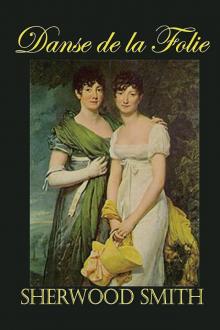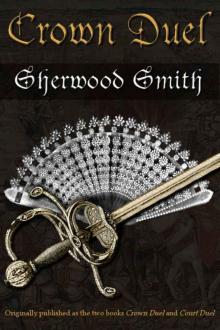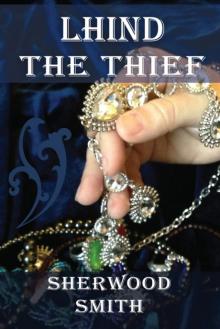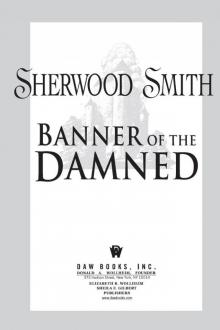- Home
- Sherwood Smith
Rondo Allegro Page 8
Rondo Allegro Read online
Page 8
Why must it always be me who has to run away? Anna had asked petulantly.
To which Parrette had replied, Aside from the question of rank, which cannot be got round, a retreat is not always running away. The smart servants learn to never let the royal children catch them, and never show fear if they do. Their example is their father, who lives for the hunt and the kill.
So what was Lise really asking? Lise had grown up during the Revolution, when people who had duennas were despised, even murdered.
Anna said peaceably, “Parrette was with my mother until she died. She chose to stay with me even though I was left with nothing. I do not pay her as I have nothing to pay her with.”
“Who was your mother?”
Anna drew in a deep breath, considering Lise’s accusatory tone. One still heard people addressed as ‘Citizen’ but ‘Madame’ and ‘Monsieur’ were also heard, and also, great people such as Madame Bonaparte no longer hid their aristocratic connections. Did Lise think that Anna was an aristocrat, or merely that she was getting above herself?
Anna walked a few steps, not seeing the muddy boulevard but her childhood, the cozy morning breakfasts with her parents. She would never lie about her birth, but she felt that the circumstances of her family’s rank were no longer relevant.
So she answered in the manner of a French professional. “My mother was a governess until she married my father. He was a musician. They are both dead.”
“Ah,” Lise said, her tone lightening, as Anna had hoped it would. “She is very clever with her fingers, Parrette. She could set up her own shop.”
“With what money?” Anna gave the Parisian shrug.
Lise laughed. “With what money indeed? Madame said you once lived in a palace, in Italy.”
Anna laughed. “And so I did. Parrette, too. Many, many people live in palaces. There are those, such as the royal family, who live in the great chambers and give the orders, and then there are the rest of us who live in the attics, and who carry out the orders.”
“Ah.”
They walked in silence the rest of the way to the theater. Later, when they left rehearsal, as there was no opera that night, Hyacinthe came to Anna and said, “Will you walk out this evening with us?”
Anna looked past her to Lise, who stood against a painted flat, half-smiling.
“Yes, I would like to, very much,” Anna said.
“Wear something pretty.” Hyacinthe patted Anna’s arm.
Anna skipped back to her rooms, her heart filled with anticipation. She would not be alone, therefore Parrette could have nothing to object to. And she could wear her prettiest gown.
Her first night out was every bit as enchanting as any stage performance. Light spilled from theaters and cafés, and everywhere people laughed, flirted, sang, danced. Hyacinthe introduced Anna to a great many people—far too many to remember. They mostly seemed to be other performers, with occasional young men rising in some profession, and then there were the officers in their dashing uniforms.
Paris was in full bloom by then, the theaters and cafés enjoying a busy season. One day they met two young naval attaches who had been sent to Paris with reports. While they were bragging about the speed of their travel, and the importance of their dispatches, they made mention of Admiral Nelson’s defeat of the Danes at Copenhagen, at the end of March the previous year.
Nelson! The English fleet! Anna had given up being concerned about Captain Duncannon, but there was still Parrette’s son Michel. However, the other girls showed scant interest. Anna tried to think of some way of introducing a question about the names of English ships, such as Michel’s Pallas, but the subject passed too quickly. She made an excuse to leave early, stopped by one of the cafés that always carried newspapers, and for the first time since her arrival in Paris, sought to find old copies.
She was successful in one place, where old newsprint was utilized in a variety of ways. A young daughter of a café owner, hoping to earn something by letting the crazy woman paw through the stacks in the basement, lingered with a candle as Anna swiftly sorted through a stack.
She found what she sought, paid the girl a handful of assignats, and carried the newspaper straight back to the Foulon. As a spring storm roared on the roof above their room, she read them. “I overheard something about Admiral Nelson, the Danes, and last year,” she said to Parrette, who stuck her needle in its paper case. She knelt on the floor beside Anna, the candle resting between them, as they compared accounts in the newspapers.
There was little enough to be gleaned. Anna remembered Madame saying that the number of newspapers had diminished steadily under the influence of the First Consul, and she saw that which was printed was decidedly unflattering to the British.
One troubling item caught her attention, and she gazed at Parrette, whose eyes looked black in the light of the single candle. “It says in here that Nelson’s ship was the Elephant.”
Parrette pursed her lips. “They must have it wrong.”
Anna shook her head. “Remember how he shifted out of Foudroyant, and then back?”
Parrette’s eyes widened. “Nom d’un nom! You think Michel is no longer in the Pallas, then.”
“If Nelson can change ships, cannot sailors, too? I’ll ask M. Dupree tomorrow,” Anna promised. “He must know—he seems to know everything about Paris that it is possible to know.”
But when Anna approached the kindly director and asked if there was some sort of British envoy, where she might find out more recent news, his round, beaming face turned serious. Drawing her aside, he said earnestly, “Don’t go pursuing that! Do you want Fouché’s mouchettes snooping around? I, for one, do not want them in my theater. It has enough problems! Please, my dear young signorina, leave well enough alone.”
Anna thanked him, and kept silence until later that day, when she caught the dancers waiting in the wings before the performance. She whispered to Hyacinthe, “Who are the mouchettes? Surely something else is meant besides little flies.”
Lise’s hearing was at least as sharp as her features. Before Hyacinthe could speak, she pulled Anna aside and in a quick, low whisper explained that ‘mouchettes’ was the nickname for the spies the sinister police chief, Fouché, employed to root out traitors as well as criminals.
“And traitors,” Hyacinthe said, her eyes round, “can be anyone he mislikes the sound of.”
“It is just that Parrette’s son was taken on board an English ship in impressment. We want to discover, if we can, where he is. If he lives.”
Lise lifted a shoulder as she absently flexed her feet while waiting for the call to places. “I am sorry for Parrette’s missing son. We all have someone gone missing, either as a soldier, or during the Terror, but we have learned to leave well enough alone.”
After the performance, as Anna carefully changed out of her costume, Parrette listened soberly to Anna’s report of her inquiries. “We must avoid direct questions,” she said. “About British ships. But there are other ways of learning, as you did with the attachés.”
“By listening,” Anna said. “It is easy enough. These soldiers? I find, the younger they are, the more they boast.”
Parrette gave a squawk of laughter. “Young! Says the old crone.”
Anna laughed, but she reflected on the newest dance apprentices, and two additions to the chorus, both relatives of the Duprees, none of whom were older than sixteen. She was no longer the youngest.
It was an odd feeling because when she walked out with the dancers, she had felt like the youngest. That was because she always returned to the Foulon at night, whereas some of the dancers went riding off in cabriolets with their beaux.
o0o
“Life is so strange,” Lise said to Anna one night, as she posed before the mirror at the end of the narrow hall on which all their doors opened. Her gown was flimsy silk, tied high, and she’d bound up her hair with a golden fillet. As she spoke, she clasped a diamond necklace around her throat, a gift from her latest swain, and pat
ted it happily into place. “A very few years ago, had I dared to go out dressed so, the mob would have hanged me, tout de suite!”
“As it is, a thief will get that necklet, see if they don’t,” Hyacinthe warned. “You are a fool to wear diamonds in the Boulevard crowd.”
Lise lifted thin shoulders, like a bird poised for flight. “And if I do? I shall demand another.” She smiled in triumph. “What is the use of having it, if I cannot flaunt it, especially under Ninon’s nose?”
Hyacinthe sighed. “If you sell it in the right place, that would house and feed us for an entire winter. Perhaps longer!”
“Eh, if a girl cannot find a wealthy boy to cover that, she deserves to starve,” Lise said carelessly, and sashayed off.
Anna felt old and experienced as she listened to the dancers. A great deal of what had been hitherto hidden was . . . if not completely comprehensible, at least somewhat clearer. Lovers, the dancers all promised, were much better than husbands, as they had to please you to keep you.
Parrette watched with tight-lipped disapproval as Anna went off with Lise and Hyacinthe. It was too much to hope that the girl would manage to stay as unworldly as her parents had in Naples’ dreadful court. But now Anna was blossoming into a young woman. She was not exactly beautiful, but she was slowly becoming the next thing to it, with a gliding walk and a graceful turn of head. It was to be expected that she would enjoy the enchantments of the Boulevard with the others, but Parrette did not intend to let her forget that, should she decide she was now a woman, she was a married one, until they found out for certain that she was a widow.
Anna sensed this wary disapproval. Having no wish to live on bad terms with Parrette, she spoke less to her about what she was thinking, and more to her new friends.
One morning, the dancers stretched legs and arms as they gossiped about someone’s sister, who until recently had danced at another theater. But now she was married.
“A husband?” Lise made a dismissive gesture. “What is the use of that? A husband, you must please, or he will beat you. A lover? If he doesn’t please you, you cast him off.” She dusted her hands in a quick movement.
“But if a very, very rich man offers to marry you, snap him up,” blonde Eleanor said, causing all to laugh.
Anna laughed with them, but she thought about how strange it was to recollect that she was married. Ordinarily she only remembered her state when she saw that ring lying among her trinkets.
A week later, Lise’s sarcasm increased abruptly, and Ninon smirked behind her back. No one could do anything right: Lise mocked Anna’s struggles to keep pace during dance practice; she mocked the singers. She mocked the other theaters, the noise the returning swallows made, the smell left by horses in the street. She and Ninon were overheard squabbling in the alley, voices rising to shrillness, then abruptly cutting off when M. Dupree went outside to demand silence, as Madame was trying to work on her aria.
Anna looked for a cause, and found it in Lise’s bare neck. The diamond necklace had not made a reappearance for days.
During a quiet moment midway through rehearsal, she caught Hyacinthe alone backstage, fetching water. “The necklace,” Anna said softly. “Was it stolen?”
“No,” Hyacinthe whispered back, looking as affronted as so gentle a creature could. “The corn merchant’s wife went to the prefecture, and claimed Lise had stolen it from her! Someone told her Lise had it. She had to return it. That is why she swears, no more merchants. Only officers. They aren’t likely to have grasping wives!”
For a few days following, Ninon went about with curled lip, never failing to drop a mention of diamonds into any conversation.
After that Lise confined herself to the officers—and not just any, but a captain who, it was said, reported directly to Chef-de-Brigade Maurin. This captain, the dancers whispered, was Ninon’s property.
For days, the two rivals entertained the company by their efforts to beguile this captain, until one morning Ninon left rehearsal with deliberate parade, climbing into a smart equipage with her new lover riding his splendid horse alongside.
Eleanor sighed, hands pressed to her heart. “Is that not romantic? He is to be stationed in the north as they prepare for the invasion of England, and he is taking Ninon with him. It is said that the officers will live in a chateau. Oh, Ninon has all the luck!”
Lise glowered from the wing, white-lipped with fury.
Parrette was watching from beside one of the flats, waiting with Anna’s costume. “Stupid hen,” she muttered. “She will be sorry enough when he tires of her.”
o0o
The gradual outward changes as spring warmed toward summer caused an inward change in Anna. She relinquished any pretense of being a prodigy. She had never liked the false feeling it gave her when she was introduced at private gatherings as one, but now, with the spectacular rise of such talents as Mademoiselle Georges, who at fifteen was performing for the Bonapartes at their private theater, as well as the Théâtre-Français, she felt it was time to drop the pose.
One night, after one of their friends inveigled a cousin at the Théâtre for tickets, Anna and her friends went to watch the new comet blaze across the stage.
“Oh, I wish I could project so effortlessly,” Anna whispered.
“You think her good? She’s as big as a cow in calf,” Lise scoffed.
“There is no music in her voice, true—her breathing’s all wrong—but the emotional range!” Anna said.
“She’s got ankles thicker than an oak,” Lise said.
Mademoiselle Georges tripped across the stage, drawing all eyes to her as she emoted a thrilling whisper that managed to carry, and then as the tragedy unfolded, her voice fell to a low, hoarse moan.
As they walked away, Hyacinthe sighed. “It was so romantic.”
“Oh, you love everything, as long as it’s soppy with tears. She was stupid,” Lise said, and turned on Anna. “The First Consul thinks her enchanting? It should have been you.”
“But I am not an actor,” Anna protested. “I’m trying to learn, because one must, in order to sing in opera, but—”
“You would be better queening over Bonaparte than that lumbering cow, and further, you would not forget your friends!”
Anna glanced at Lise’s sharp profile. Though they were different in every other way, Lise reminded her of certain of the Neapolitan princesses, who regarded everything, from decorations on shoes to who got in the pony carts first, as competitions. She returned to the Foulon in a thoughtful mood.
A few days later, Anna was leaving the Foulon to walk to rehearsal, smartly dressed as always, when she spied a grand carriage drawn up in the street. She sidestepped young Pierre Dupree, the owner’s younger brother and general factotum, busy talking to a young man in a new livery of green and gold. That was the First Consul’s livery, Anna thought, wondering what he was doing at the Foulon.
She’d taken no more than two steps when both faces turned her way. “There she is,” Pierre said. “Signorina Bernardo! This man has a summons for you.”
Anna’s heart began to pound. All she could think of was the Minister of Police, and her questions about British naval matters, as she drew near. “Are you certain you want me?” she managed.
The young man consulted a rumpled slip of paper. “Mademoiselle Ludovisi,” he pronounced carefully, “also known as Signorina Bernardo?”
Anna’s throat went dry. “That is I.”
“Well, then, I am to escort you to the Tuileries.” And when Anna lifted her hands, one pointing helplessly toward the Foulon, and the other gesturing vaguely at her bare head, the footman said, “Come as you are. I’m to take you and bring you back. You needn’t bring anything.”
Bring you back. These words heartened Anna enough to enable her to climb into the carriage, though her legs shook. All up and down the street, people turned to stare as the footman climbed up onto the box next to the driver, and waved his hand. “Clear away! Clear away!”
“That woul
d have netted you a fast trip to Madame Guillotine ten years ago,” a wizened old woman called as she walked slowly in front of the horses. She cackled as she looked Anna up and down. “And so would that fine gown! Ha-ha-ha!” She walked off, crowing with laughter.
“Take it up with the First Consul,” the footman retorted with a laugh, as the driver touched the whip to his pair.
A short time later, the carriage rolled through the Place du Carrousel and to the Tuileries, a very long building. To her relief, she was not taken anywhere near the Consular family’s private wing, but to a portion of the building from which she could hear the cacophony of violins tuning, and here and there the quick, brassy sound of horns.
A few minutes later, she was conducted into a small office that smelled of wet plaster, where she stood in amazement. “Maestro Paisiello!”
“My dear child!” The maestro threw open his arms, nearly knocking a pile of music sheets from the crowded desk. Powder puffed into the air from his wig as he lunged to rescue the pages. “I need not ask how Paris has treated you, I have the evidence of my eyes! I can scarcely wait to tell Madame. She will wish to see you, but she is at the moment under the care of a physician. You must call upon her when she has recovered from the journey.”
“Most assuredly. May I ask what brings you and la signora here?” They had fallen into their old habit of speaking in Neapolitan, which to her was the natural language of music, even more so than Italian.
“You will remember that the First Consul favored me with a commission for General Hoche’s funeral march. Well, ever since, he has invited me to Paris. Of course I did not wish to quit Naples until the king himself bade me come hither, as a gesture of friendship toward the First Consul. And so, behold me! I am now in charge of the music of the consular court. Guillard has given me a fine Proserpina, which will serve as my introduction to the French tragedie-lyrique. As you see, I am in the midst of writing the music.”
Anna had not spent all this time without understanding something of how the musical life of Paris went. “He brought you here, Maestro? It is wonderful news, but…”

 Inda
Inda Danse De La Folie
Danse De La Folie King's Shield
King's Shield Whispered Magics
Whispered Magics Fleeing Peace
Fleeing Peace Barefoot Pirate
Barefoot Pirate Crown Duel
Crown Duel Mearsies Heili Bounces Back
Mearsies Heili Bounces Back Commando Bats
Commando Bats A Stranger to Command
A Stranger to Command Lhind the Spy
Lhind the Spy The Spy Princess
The Spy Princess Blood Spirits
Blood Spirits Sasharia en Garde
Sasharia en Garde Lhind the Thief
Lhind the Thief Paradise Drift
Paradise Drift Banner of the Damned
Banner of the Damned The Trouble With Kings
The Trouble With Kings Poor World
Poor World Treason's Shore
Treason's Shore Wren Journeymage
Wren Journeymage A Posse of Princesses
A Posse of Princesses Revenant Eve
Revenant Eve Once a Princess
Once a Princess Time of Daughters I
Time of Daughters I Rondo Allegro
Rondo Allegro Coronets and Steel
Coronets and Steel Over the Sea
Over the Sea Senrid
Senrid Hunt Across Worlds
Hunt Across Worlds A Sword Named Truth
A Sword Named Truth The Fox
The Fox Twice a Prince
Twice a Prince Fair Winds and Homeward Sail: Sophy Croft's Story
Fair Winds and Homeward Sail: Sophy Croft's Story Time of Daughters II
Time of Daughters II The Rifter's Covenant
The Rifter's Covenant The Phoenix in Flight
The Phoenix in Flight Stranger
Stranger The Thrones of Kronos
The Thrones of Kronos A Prison Unsought
A Prison Unsought Twice a Prince: Sasharia En Garde Book 2
Twice a Prince: Sasharia En Garde Book 2